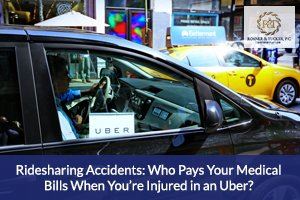In July, an Uber driver in an SUV jumped a curb in Chelsea, New York, and hit two pedestrians before crashing into a cell phone store. Four people were injured in the crash, and the driver, 43-year-old Amir Saleemi of Edison, New Jersey, was arrested for driving with a suspended license. This accident highlights the growing number of Uber and Lyft accidents on our roadways and raises questions about liability.
Rideshare companies like Uber and Lyft have become increasingly popular in cities across the country. Uber officially launched in New Jersey in 2013, and drivers completed 9.5 million trips in the first two years alone in the Garden State. According to Uber and Lyft, rideshare services have saved countless lives and prevented deadly accidents from occurring by reducing drunk and late-night driving. Yet, even when using a rideshare service, accidents can still happen. If you are injured in an accident in an Uber or Lyft, who pays your medical bills? Who is responsible for your injuries and for damages?
Insurance Liability in Rideshare Accidents
Lyft and Uber drivers are amateur drivers who use their own personal vehicles to transport passengers to and from their destinations. When a rideshare driver is involved in an accident, it can be difficult to know where to file a claim. Is the rideshare driver liable for the accident, or is it the rideshare company’s responsibility to pay for the injuries their drivers cause?
Both Lyft and Uber carry commercial insurance policies with $1.5 million coverage limits, which cover passenger injuries when rideshare accidents occur. It’s important to note, however, that they only cover accidents that occur when the driver is actively engaged in transporting a passenger or picking them up. And even if the driver is on duty at the time of the accident, determining liability in a ridesharing accident is complex and involves extensive investigation.
For example, consider the following scenarios:
- Driver is on duty but not assigned a fare – In this scenario, the driver is usually waiting for a customer. If the driver hits a pedestrian or other vehicle during this time, then the driver’s own personal auto insurance will bear the primary responsibility of the accident.
- Driver is on duty and accepted a fare – In this scenario, the driver has accepted a fare and is on the way to pick up a passenger. In situations like this, Uber or Lyft is likely responsible for the injuries that occurred during this time. They may request that the driver’s own personal insurance policy be exhausted first, however.
- Driver is on duty and carrying passengers – In this scenario, the ridesharing company’s insurance will be liable for the injuries, as well as any damages sustained.
Contact Our New Jersey Rideshare Accident Lawyers
If you are injured in an accident as a rideshare passenger, establishing liability can get complicated quickly, especially if there are other cars involved in the accident. A New Jersey car accident attorney who understands the legalities and complexities of rideshare accidents will help you during this difficult time. Contact Rosner Law Offices, P.C. today for a free initial consultation and review of your case.



 Call Us
Call Us Text Us
Text Us Email Us
Email Us